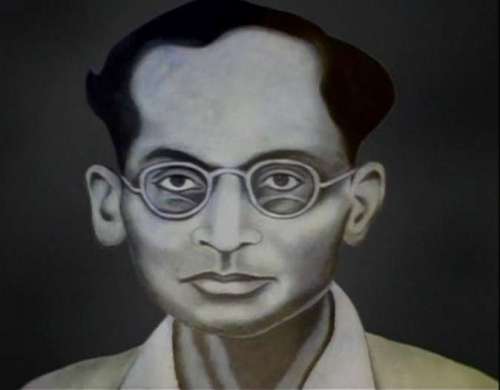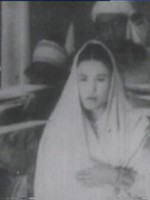Jyoti Prasad Agarwala is a Director, Scriptwriter, Producer, Editor and Sound Indian born on 17 june 1903

Jyoti Prasad Agarwala (Assamese: জ্যোতিপ্ৰসাদ আগৰৱালা; 1903 - 1951) was a noted Assamese playwright, songwriter, poet, writer and film maker from Assam. He was considered as Assamese cultural icon, deeply revered for his creative vision and output and is popularly called the Rupkonwar (ৰূপকোৱঁৰ) of Assamese culture. In fact, he is regarded as the founder of Assamese cinema for Joymati (1935). His death anniversary (January 17) is celebrated as Silpi divas (Artists' Day) in his honor.
After his return to Assam, he continued his activities for Indian independence that had disrupted his studies earlier and in 1932 he was imprisoned for fifteen months. He established the Chitraban Studio at the Bholaguri Tea Estate and began filming the movie Joymoti around the end of 1933. This was the first film from Assam. The film, released in 1935, was based on a play by Laxminath Bezbarua about the heroic Ahom princess Sati Joymoti imprisoned and tortured by a repressive Ahom swargadeo. In 1936 he married Devajani Chaliha. In 1941 he participated in the freedom movement, and in 1942, he went underground to escape British repression. Toward the end of his life he moved from a romantic to a more radical vision, which was reflected in his works.
Source : Wikidata
Jyoti Prasad Agarwala

Biography
Jyoti Prasad Agarwala was born on 17 June 1903 in an Agrawal family, to Paramananda Agarwala and Kiranmoyee Agarwala in Tamulbari Tea Estate. He is the nephew of another cultural icon, Chandra Kumar Agarwala. His forefather, Nabrangram Agarwala, had come to Assam in 1811 from the Marwar region in Rajasthan. After completing his studies in various schools in Assam and Calcutta (Kolkata), he matriculated in 1921. He went to Edinburgh in 1926 to study economics, but returned in 1930 before completing his course. On his way back, he spent seven months at the UFA studio in Germany learning film-making.After his return to Assam, he continued his activities for Indian independence that had disrupted his studies earlier and in 1932 he was imprisoned for fifteen months. He established the Chitraban Studio at the Bholaguri Tea Estate and began filming the movie Joymoti around the end of 1933. This was the first film from Assam. The film, released in 1935, was based on a play by Laxminath Bezbarua about the heroic Ahom princess Sati Joymoti imprisoned and tortured by a repressive Ahom swargadeo. In 1936 he married Devajani Chaliha. In 1941 he participated in the freedom movement, and in 1942, he went underground to escape British repression. Toward the end of his life he moved from a romantic to a more radical vision, which was reflected in his works.
Usually with
Filmography of Jyoti Prasad Agarwala (2 films)
Director

Joymoti (1935)
Directed by Jyoti Prasad Agarwala
Genres Biography, Historical
Actors Aideu Handique, Swargajyoti Barooah, Phani Sarma
Rating9%





Set in 17th-century Assam, the film recounts the sacrifice of Joymoti, an Ahom princess tortured and killed by the Ahom king Borphukan for refusing to betray her husband Gadapani by disclosing his whereabouts. The event is interpreted in contemporary patriotic terms, and calls for a greater harmony between the people of the hills and those of the plains. The hills are represented by the leader Dalimi, a Naga tribeswoman who shelters the fugitive Prince Gadapani.
Scriptwriter

Joymoti (1935)
Directed by Jyoti Prasad Agarwala
Genres Biography, Historical
Actors Aideu Handique, Swargajyoti Barooah, Phani Sarma
Rating9%





Set in 17th-century Assam, the film recounts the sacrifice of Joymoti, an Ahom princess tortured and killed by the Ahom king Borphukan for refusing to betray her husband Gadapani by disclosing his whereabouts. The event is interpreted in contemporary patriotic terms, and calls for a greater harmony between the people of the hills and those of the plains. The hills are represented by the leader Dalimi, a Naga tribeswoman who shelters the fugitive Prince Gadapani.
Producer

Indramalati (1939)
Directed by Jyoti Prasad Agarwala
Genres Drama, Romance
Actors Phani Sarma, Sultana
Roles Producer

Joymoti (1935)
Directed by Jyoti Prasad Agarwala
Genres Biography, Historical
Actors Aideu Handique, Swargajyoti Barooah, Phani Sarma
Roles Producer
Rating9%





Set in 17th-century Assam, the film recounts the sacrifice of Joymoti, an Ahom princess tortured and killed by the Ahom king Borphukan for refusing to betray her husband Gadapani by disclosing his whereabouts. The event is interpreted in contemporary patriotic terms, and calls for a greater harmony between the people of the hills and those of the plains. The hills are represented by the leader Dalimi, a Naga tribeswoman who shelters the fugitive Prince Gadapani.
Editor
Sound

Joymoti (1935)
Directed by Jyoti Prasad Agarwala
Genres Biography, Historical
Actors Aideu Handique, Swargajyoti Barooah, Phani Sarma
Rating9%





Set in 17th-century Assam, the film recounts the sacrifice of Joymoti, an Ahom princess tortured and killed by the Ahom king Borphukan for refusing to betray her husband Gadapani by disclosing his whereabouts. The event is interpreted in contemporary patriotic terms, and calls for a greater harmony between the people of the hills and those of the plains. The hills are represented by the leader Dalimi, a Naga tribeswoman who shelters the fugitive Prince Gadapani.
 Connection
Connection




